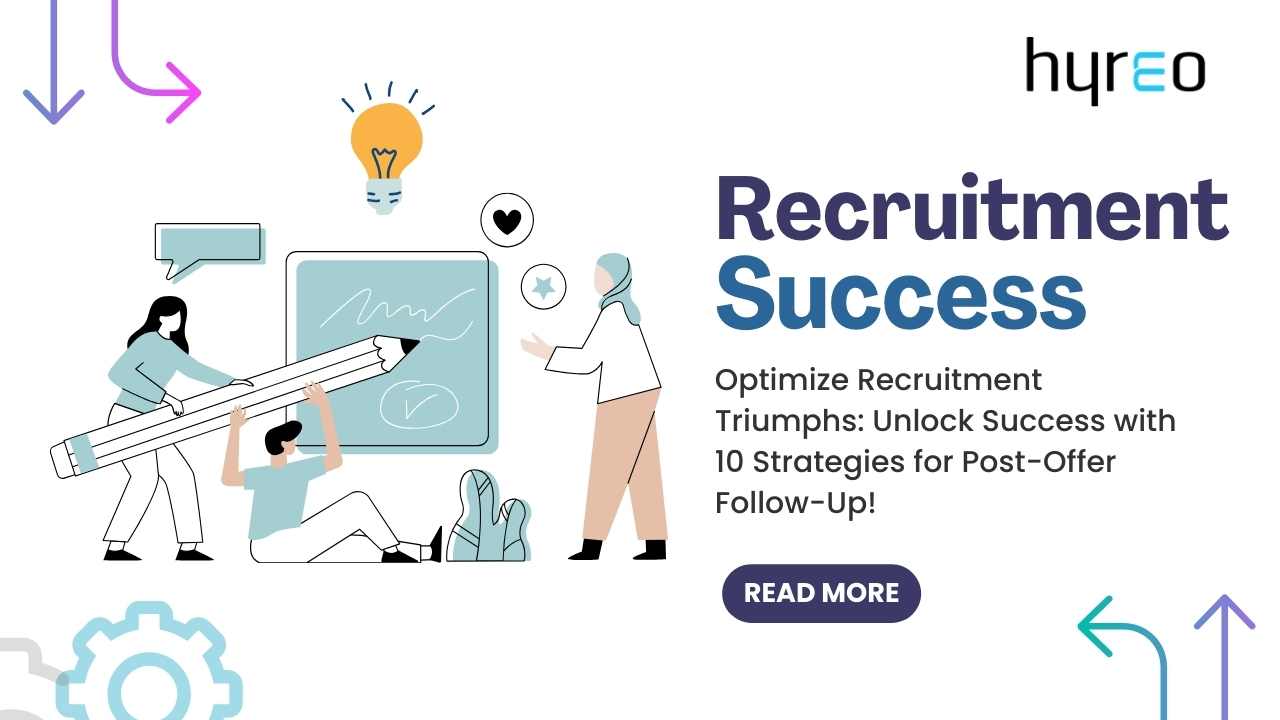Hiring the right candidates has become crucial for the success of any organization. It is, after all, a known fact that the right people can drive the company toward its goals.
While recruiters focus on attracting and selecting the best talent, they often overlook one critical aspect: the importance of post-offer follow-up (POFU).
POFU refers to the process of maintaining contact with candidates after they have been offered a job.
It is imperative to understand the benefits of POFU in recruitment and how it can help organizations retain top talent.
Top 10 Benefits of Post-Offer Follow-Up POFU
#1 Builds a Strong Relationship with Candidates
POFU helps recruiters build strong relationships with candidates. By keeping in touch with candidates after accepting the job offer, recruiters can make them feel valued and appreciated.
This can help candidates feel more committed to the organization and more motivated to perform well in their new role. Furthermore, POFU helps establish trust and credibility, leading to stronger relationships with candidates.
Check – Best Post Offer Candidate Engagement Platform
#2 Improves Candidate Experience
A positive candidate experience is crucial in today’s job market. Candidates with a positive experience are more likely to recommend the organization to others and apply for future job openings.
POFU plays a vital role in improving the candidate experience. By maintaining regular contact with candidates after the job offer has been accepted, recruiters can ensure that candidates have a smooth transition into their new role.
This can include addressing candidates’ concerns or questions, providing relevant information, and introducing them to key team members.
Check – A Candidate Engagement Guide
#3 Helps Address Candidate Concerns
POFU allows recruiters to address any concerns or questions that candidates may have. This can be especially useful when a candidate may have accepted another job offer or has concerns about the organization’s culture or work-life balance.
By addressing these concerns, recruiters can help candidates feel more confident and motivated about their decision to join the organization. This, in turn, can lead to a more positive candidate experience and increased retention rates.
#4 Reduces Turnover Rates
High turnover rates can be costly and damaging to an organization’s success. POFU can help reduce turnover rates by ensuring that candidates feel supported and valued even after starting their new job.
Regular communication with candidates can help identify any issues or concerns during the onboarding process, allowing recruiters to take proactive measures to address them. This can improve retention rates and reduce the costs associated with turnover.
#5 Enhances Referral Rates
Referral candidates are often high-quality and require less time and resources to recruit. POFU can enhance referral rates by ensuring candidates have a positive experience and feel valued by the organization. The Staffing Industry Analysis clearly showcases how 42% of employers are experiencing a high turnover the referrals become even more crucial.
Candidates with a positive experience are more likely to recommend the organization to their friends and colleagues.
By building a strong relationship with candidates and maintaining regular contact, recruiters can increase the likelihood of referrals and reduce recruitment costs.
#6 Provides Valuable Feedback
POFU provides a valuable opportunity for recruiters to gather feedback from candidates. This feedback can improve the recruitment process and make it more efficient.
According to LinkedIn statistics, 52% of candidates who were asked to provide feedback after the interview are more likely to resume their relationship with that organization.
Candidates may provide insights into their experience with the organization, the recruitment process, or their interactions with recruiters.
By gathering feedback, recruiters can identify areas for improvement and make necessary changes to ensure a positive candidate experience.
#7 Fosters Long-Term Relationships
POFU can help foster long-term relationships with candidates. By maintaining regular contact with candidates, recruiters can keep them informed about new job openings, industry trends, and company news.
This can help build trust and credibility with candidates, which can lead to future job opportunities. Furthermore, candidates who have a positive experience with the organization may become brand ambassadors, promoting the organization to their networks and increasing its visibility in the job market.
#8 Demonstrates Organization’s Commitment
POFU demonstrates the organization’s commitment to its employees. By investing in POFU, organizations can show candidates that they are valued members of the team and their contributions are appreciated.
This can help create a positive work culture and foster employee engagement. Furthermore, candidates who feel valued and appreciated are more likely to be loyal to the organization and contribute to its success.
#9 Improves Diversity and Inclusion
POFU can help improve diversity and inclusion in the workplace. By maintaining contact with candidates from underrepresented groups, recruiters can ensure that they feel supported and valued within the organization.
Regular communication with candidates can also help identify any issues related to diversity and inclusion, allowing organizations to take proactive measures to address them.
This can create a more inclusive work environment and attract a more diverse pool of candidates in the future.
Check – A guide to Build Diverse Talent Pool
#10 Provides Insight into Candidate’s Needs and Preferences
POFU can provide valuable insight into a candidate’s needs and preferences. During the follow-up process, recruiters can ask candidates about their expectations, concerns, and preferences related to the position, the company culture, and the overall work environment.
By gathering this information, recruiters can tailor their approach to each candidate, increasing the chances of making a successful hire.
This can also help organizations improve their recruitment strategy by identifying common themes and trends among candidates and adjusting their processes accordingly.
Conclusion
In conclusion, POFU is a powerful tool to help organizations attract and retain top talent in today’s competitive job market.
By prioritizing POFU, recruiters can improve the candidate experience, gather valuable feedback, foster long-term relationships, demonstrate the organization’s commitment, and improve diversity and inclusion.
Furthermore, POFU can provide insight into a candidate’s needs and preferences, allowing recruiters to tailor their approach and increase the chances of successful hiring.
With so many benefits, it’s clear that POFU is an essential component of any recruitment strategy.
FAQs on Post Offer Follow Up
What does POFU mean?
POFU stands for “Post Offer Follow-Up.” It is a term used in recruitment and hiring, referring to the process of following up with candidates after an employment offer has been made. POFU is important in recruitment because it allows recruiters to maintain communication with candidates and ensure a positive candidate experience.
It can also help reduce turnover, enhance referral rates, gather valuable feedback, foster long-term relationships, demonstrate the organization’s commitment, and improve diversity and inclusion.
What is the advantage of an external source of recruitment?
Recruiting external candidates for a job opening can offer several advantages for organizations. By accessing a wider pool of candidates, organizations can find the best fit for the job and increase diversity in their workforce.
Additionally, external candidates can bring fresh perspectives and ideas to the organization, leading to increased productivity and innovation.
Using external recruitment sources can also help organizations build their employer brand and attract talent with specialized skills or experience.
External recruitment can help organizations achieve their business goals by bringing in new talent and diversifying their workforce.
What are some of the reasons for filling positions internally?
Filling positions internally refers to promoting or transferring existing employees to fill open positions within an organization. Here are some reasons why organizations may choose to fill positions internally:
1. Retaining top talent: By promoting or transferring existing employees, organizations can retain their top talent and reward their hard work and dedication.
2. Cost-effective: Filling positions internally can be cost-effective, as organizations save on recruitment and training costs. Internal candidates already know of the organization and its culture, which can reduce the time and resources required for onboarding.
3. Increased employee motivation: It can also increase employee motivation and job satisfaction, as they feel valued and recognized for their contributions. This can lead to increased productivity and loyalty.
How can I make my recruitment process more effective?
Recruiting the suitable candidates is essential to building a strong and successful organization, and an effective recruitment process can help achieve this goal. Here are some tips to make your recruitment process more effective:
Firstly, defining job requirements is essential. By being clear about the skills, qualifications, and experience required for the job, you can attract the right candidates and reduce the number of unqualified applicants. This saves time and resources in the recruitment process.
Secondly, using various recruitment sources can also improve the effectiveness of the process. Posting job ads on job boards, social media, and company websites can help reach a wider pool of candidates. Additionally, employee referrals and internal promotions can help identify talented candidates who are already familiar with the organization.
Thirdly, pre-screening applicants can also help make the recruitment process more effective. Conducting phone or video interviews before inviting candidates for in-person interviews can help identify the most qualified candidates.
What are the advantages of referral?
Employee referrals are a popular recruitment method where current employees refer potential candidates for open positions.
Employee referrals can help identify high-quality candidates quickly. Employees are likely to refer to individuals they believe are a good fit for the organization and have the necessary skills and qualifications for the job.
Further, referrals can help increase employee retention. When employees feel like they are part of the recruitment process, they feel more invested in the organization’s success and are more likely to stay with the company.
Referrals can also help reduce recruitment costs. Since employee referrals can reduce the time and resources required for recruitment, organizations can save money on advertising and other recruitment costs.
Overall, using employee referrals in the recruitment process can help organizations identify high-quality candidates quickly, increase employee retention, reduce recruitment costs, and improve the quality of new hires.




